The subtleties of the improvement of suburban areas

The idea of being close to nature is by no means new. They appeared more than three centuries ago and do not lose their relevance. Probably, every person at least once in his life felt the desire to move away from the bustle of the city, constant stress, to relax his soul. And for some people in the conditions of modern ecology, suburban life helps to significantly improve their health. Do not forget the role of the dacha as an aid to the family budget in times of crisis. Often it also serves as a resting place. But natural vegetables and fruits grown with your own hands will be a pleasant bonus.
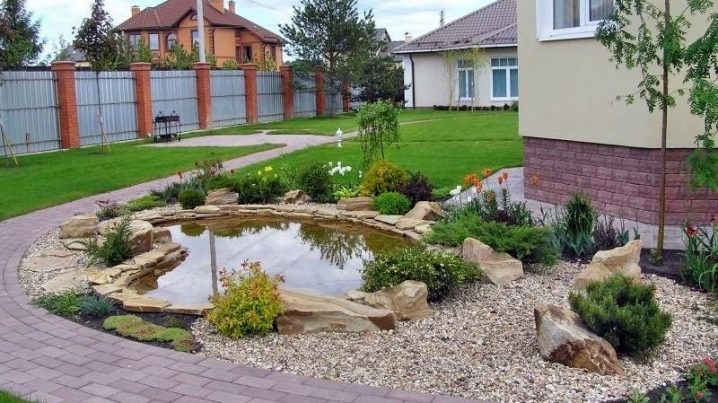
Peculiarities
First of all, the type of land plot depends on the purpose for which it is supposed to be used. Using as a place for growing certain vegetable or fruit and berry crops may not even provide for the construction of a house - a temporary shed will be enough for storing inventory. When at the dacha it is planned not only to harvest, but also to spend time with friends, you can install a gazebo. And if you are supposed to spend the night or even stay - you need a place to sleep, cooking and arranging the surrounding area, carrying out the necessary communications.
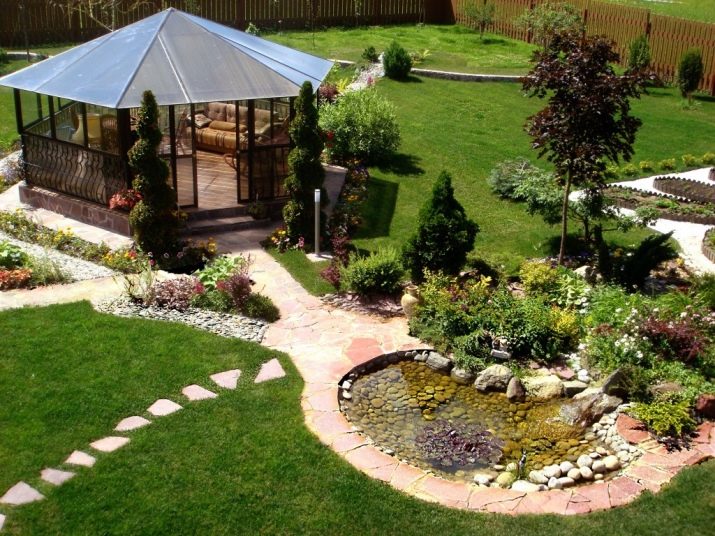
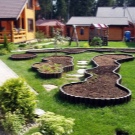
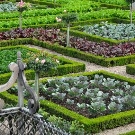
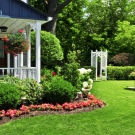
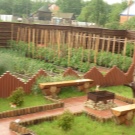
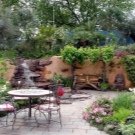
Seasonal use differs from permanent use. The building should be designed for year-round living, and communications (lighting, plumbing, heating) functioning in different temperature conditions. Other buildings should be present - a garage, a bathhouse, a greenhouse. The site itself must function in different weather conditions - have solid paths, good lighting, the possibility of access in winter. For an autonomous existence, it is desirable to have a well (or well) or have your own source of electricity generation (generator).
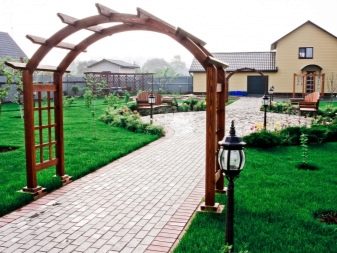
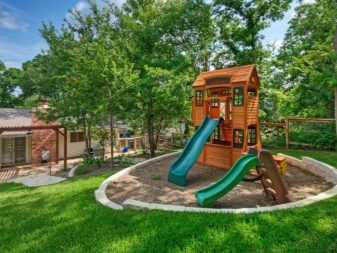
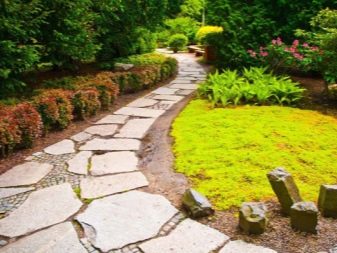
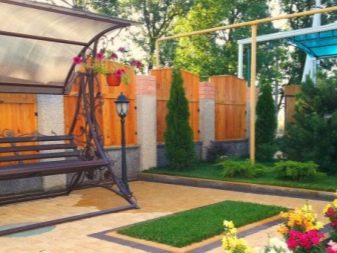
The internal equipment of the house (including furniture), with its irregular use, must be resistant to temperature extremes. If you are not going to constantly maintain the same level of humidity or heat, when choosing materials, first of all, evaluate their practicality.
Take your time to demolish everything that was on the site before. Perhaps some objects of animate and inanimate nature will be useful for decorating it. Half-buried boulders or stumps will be the starting point of your imagination.
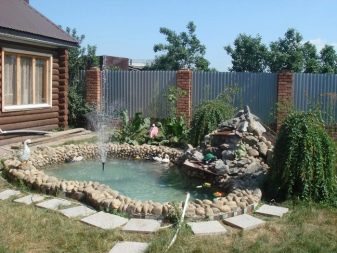
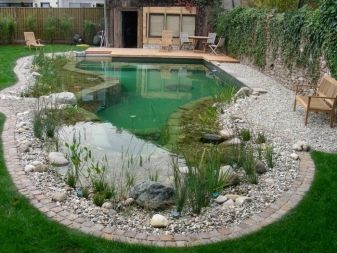
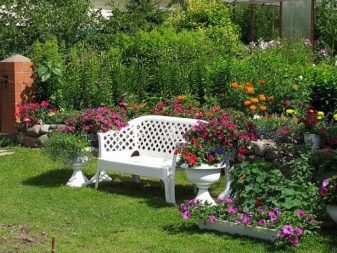
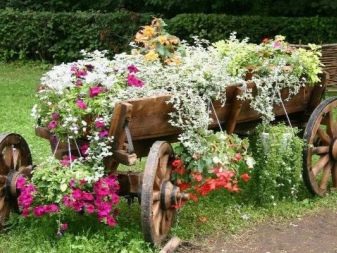
Styles
The stylistic design entirely depends on the preferences of the owners. Probably, every person in his dreams has an image of a place where he can completely relax. Most ideas are easy to implement.
Russian style inspired by tall fairytale towers or low huts without a single nail. Its originality and simplicity is captivating. In addition to the carved decoration of the house, you can use symbolic carts, stoves, barrels, sandals, clay jugs, stuffed animals. The main material is wood (painted or covered with wood stain or varnish). The area in front of the house is covered with wooden decking, as are the trails. The fence can be solid with massive gates or low in the form of a wattle fence or bed.
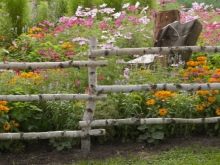
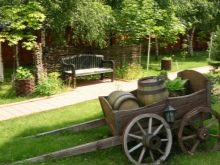
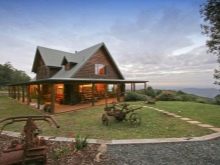
European is similar to it country style, in which, along with wood, raw stones, straw, forged metal products are widely used. He's more discreet. Floral motifs in painting or other wood processing will become decorative elements of a house or a gazebo.
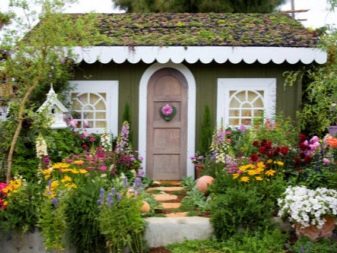
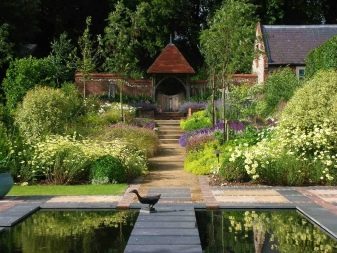
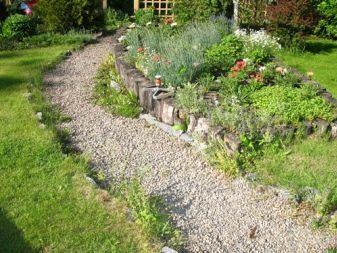
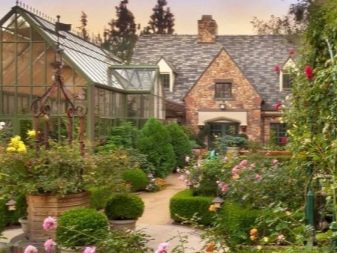
Vegetation should be natural - undersized shrubs, wildflowers.
Garden in english style geometric, all lines are clear, shrubs and trees are trimmed. The flower beds are symmetrical. Manicured lawns are another consequence of the famous pedantry of the British. Thanks to many years of care and special varieties, you can play sports, relax, have picnics on them, and this will not bring them any harm.
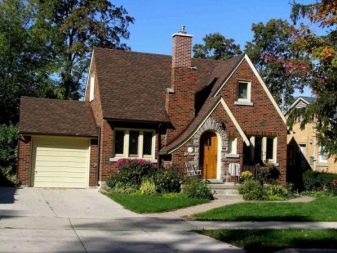
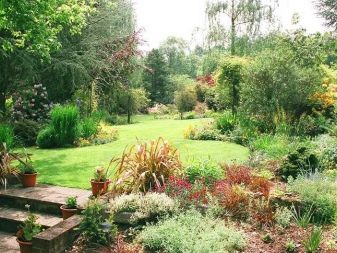
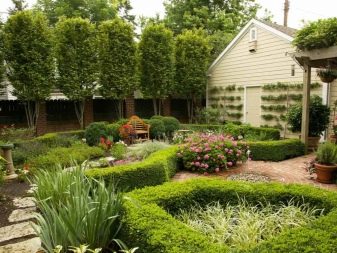
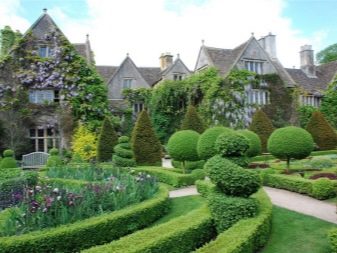
At the heart of the famous Japanese gardens stones lie the idea of contemplation and meditation. It would seem that cobblestones of different sizes laid in a chaotic manner actually have a special meaning. A crane and a turtle, which are a symbol of the height of spirit and longevity, as well as the deity itself - Buddha, act as decor.
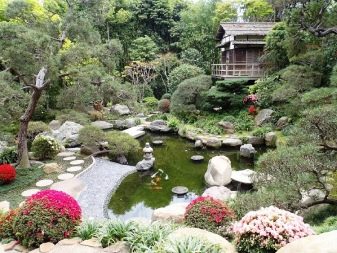
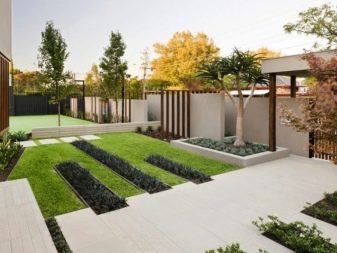
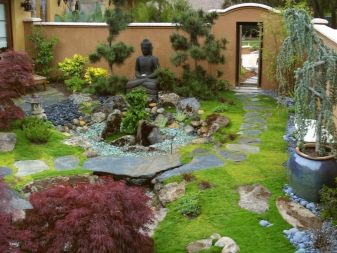
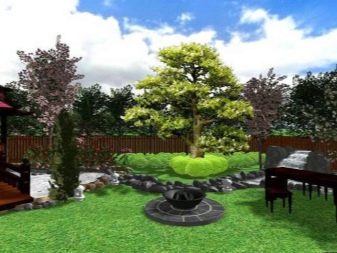
African styles amaze with their scale and luxury. The main attribute is a patio, well protected from prying eyes, with an invariable reservoir in the form of a small pool or fountain. The paths, fence and facade of the building are finished with colorful mosaic tiles. If possible, exotic plants are planted that can adapt to the appropriate climate.
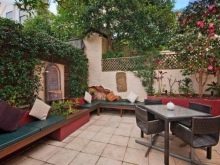
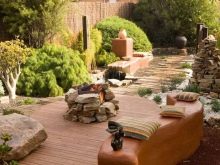
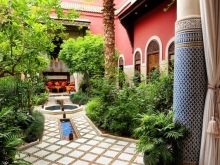
Looks no less impressive castle style... Of course, this design is more suitable for spacious areas, preferably with a reservoir in which the structure will be reflected. The atmosphere of the Middle Ages will be complemented by arches, bridges, statues in the garden.
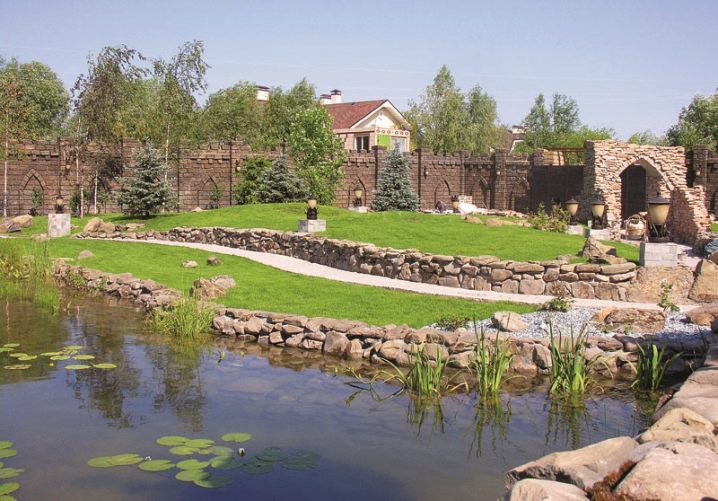
More modern style minimalism - a real find for conservatives who love outwardly simple, but at the same time functional solutions. Hi-tech is a reflection of all technical and scientific achievements - the most resistant materials, unusual shapes and spectacular design solutions.
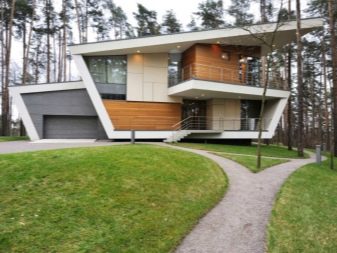
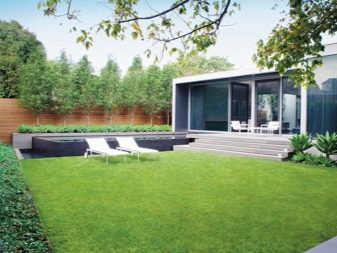
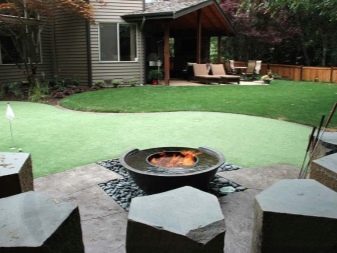
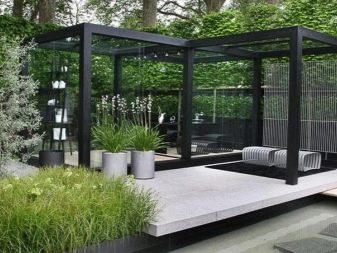
Design
Having received an already equipped site in the ownership, all subsequent improvement must be carried out taking into account the existing objects. It is much more convenient in this regard, previously uncultivated land. However, designing it is a complex, time-consuming process that will affect how everything will look after modification and how comfortable it will be for people. In addition, it is necessary to carry out all work as efficiently as possible, without unreasonable costs, harm to the environment and in accordance with existing rules and regulations.
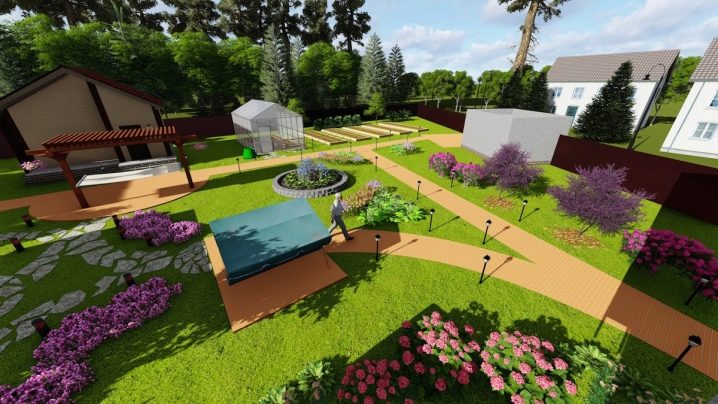
All design decisions must be technically sound, since any land plot is an ecosystem. It is quite easy to unbalance this system, but to correct the consequences is much more difficult. Therefore, it is better if the project will be dealt with by specialists, or at least it is necessary to be able to get qualified consultations on certain issues.
If you are going to do the design yourself, you need to carefully study and take into account the following factors:
- Information about the size and shape of the site (cadastral plan).
- Conditions for access to utilities, borders and neighboring facilities in the adjacent territory.
- Results of geological and geodetic studies (characteristics of soil, relief, etc.)
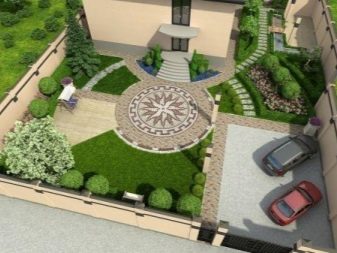
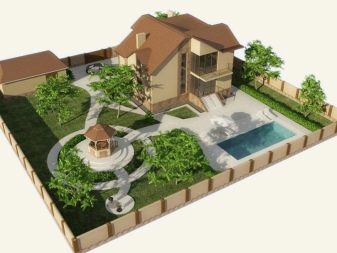
Obtaining such information is a rather lengthy and costly process, therefore, the average values for the area and the experience gained in this area are often used.
You can use general tips:
- The most suitable for both agriculture and construction is a flat place without elevation differences. However, there are advantages to be drawn from any position. A house on a hill will always be dry, with a good view. The slope will always promote the accumulation of water, which is good for moisture-loving plants.
- Soil quality can vary significantly even in one area. Therefore, if a garden or vegetable garden is planned, it may be necessary to add fertilizers or even purchase quality soil.
- The location of buildings and vegetation depends on the depth of the waters.
- An area with a predominance of one or another wind at different times of the year will help not only to correctly arrange the rooms in the house, but also to choose a fence. Do not put a solid fence around the entire perimeter.Soil and plants need good air exchange. Trees and tall shrubs also provide good shelter from wind and snow drifts.
- Lighting is an important condition for the existence of all living things. Therefore, it is necessary to plan the elements so that there is enough light for people and greenery.
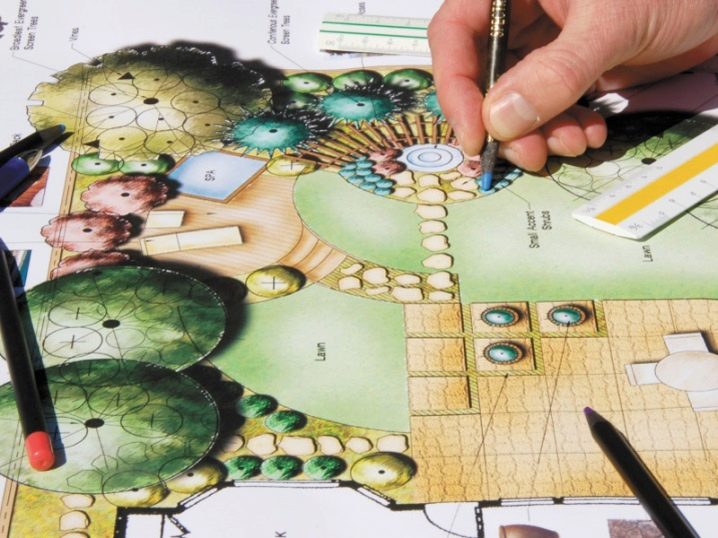
The shaded sections cannot be avoided at all, but they can be adapted for household needs.
Zoning options
First of all, the division into zones rests on their purpose.
If you do not take into account the very simple options, where the entire plot is occupied by a garden or vegetable garden, there are several main elements:
- dwelling;
- outbuildings;
- place to rest;
- landscaping.
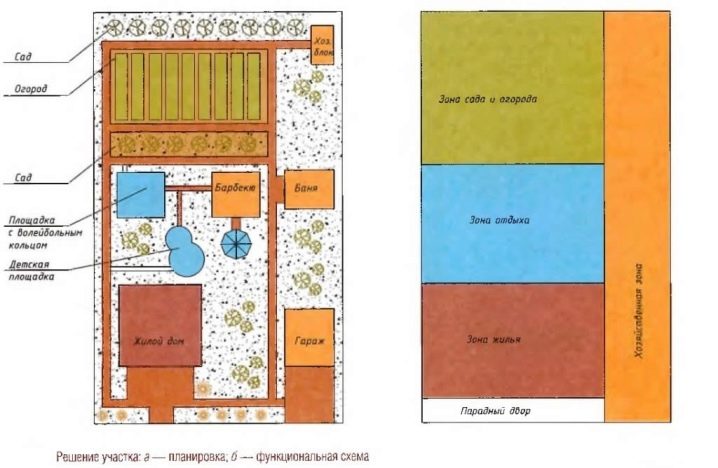
Depending on what the owner attaches more importance to, one or another part of the circuit will take up more or less space, and some may not be at all.
As already discussed above, many factors affect the location of the house, like other objects. In addition to them, an important indicator is the area. To save space, the house can be placed as close as possible to the border, and the rest of the area can be occupied with beds or trees. When they are not needed, the house can be placed in a better position.
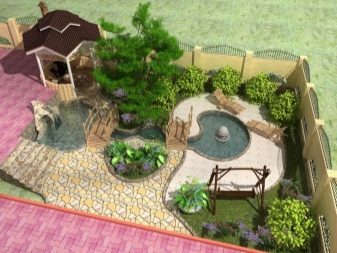
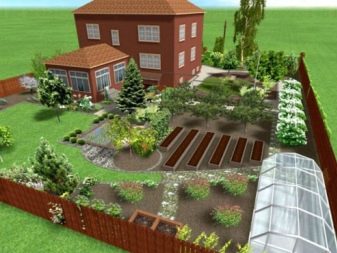
If the façade is of a certain artistic value, it should be clearly visible from any point.
Utility rooms and other rooms are usually placed so as not to spoil the appearance of the house, but with the expectation that the transition to them is not difficult.
These include:
- summer cuisine;
- garage;
- bath;
- cellar;
- buildings for storing inventory;
- boiler rooms;
- greenhouses;
- septic tanks.
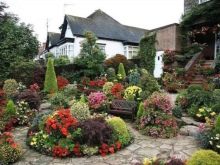
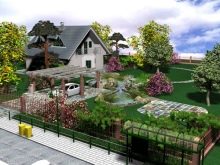
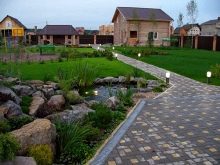
Here it is necessary to observe the distance between buildings in order to comply with sanitary and hygienic requirements and fire safety standards. First and foremost, they must be practical. And so that the objects do not seem scattered, a common style is a prerequisite.
All kinds of gazebos with places for barbecue or barbecue, sports and playgrounds are suitable for large areas. But even on six acres, you can allocate a place for a barbecue and a sandbox. Places for children and active games must have special equipment and coverage. The scenic views and splashing water contribute to the greatest relaxation.
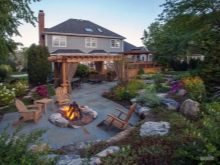
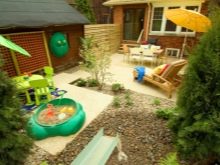

A "green" area can include a garden, vegetable garden, flower beds and other plantings on a personal plot. For people who love to grow organic products, this part will be the most extensive and located, taking into account the most optimal lighting.
The most popular zoning tools are:
- tracks (paved or natural);
- shrubs, flower beds and hedges (if you use berry bushes instead of ornamental bushes, you can use the area more rationally);
- low, translucent and breathable hedges (in case you want to protect plantings, for example, from pets) with arches or wickets;
- elevation differences (natural or specially created);
- natural or artificial reservoirs.
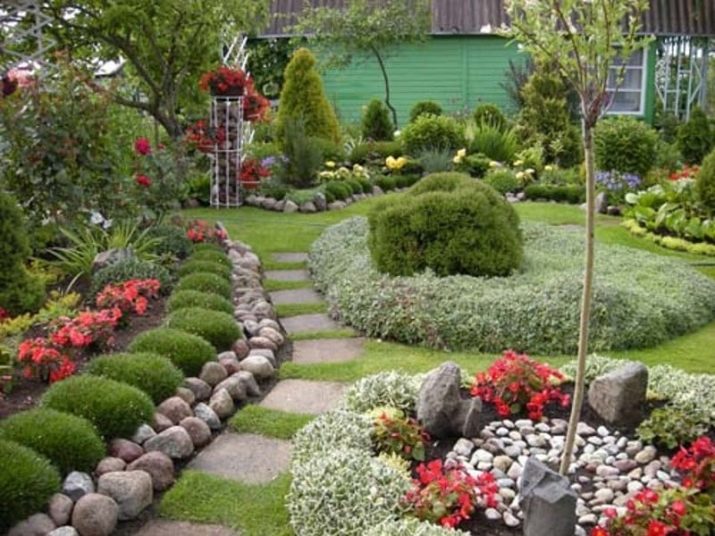
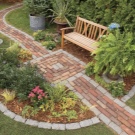
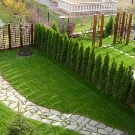
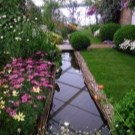
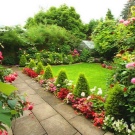
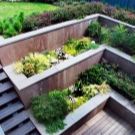
Beautiful examples
The most common form of a summer cottage is rectangular or elongated. If we consider land with an area of 10 acres as an example, the basic principle is the sequential arrangement of zones one after another. First of all, a house is located next to the entrance, which essentially closes the rest of the territory from prying eyes. The garden should not be located in the front or in the middle, as it will be a walk-through - this is less convenient and will bring more harm to the plants.
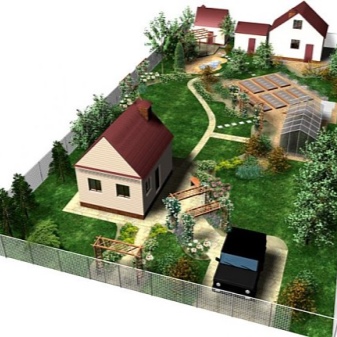
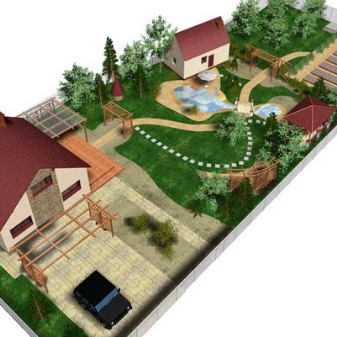
If the territory is square, and the area is relatively small (5-6 acres), then there are relatively few options for location on it. The most optimal - when housing occupies one corner, and everything else is located around it - and each of the corners is a separate area, separated by paths.
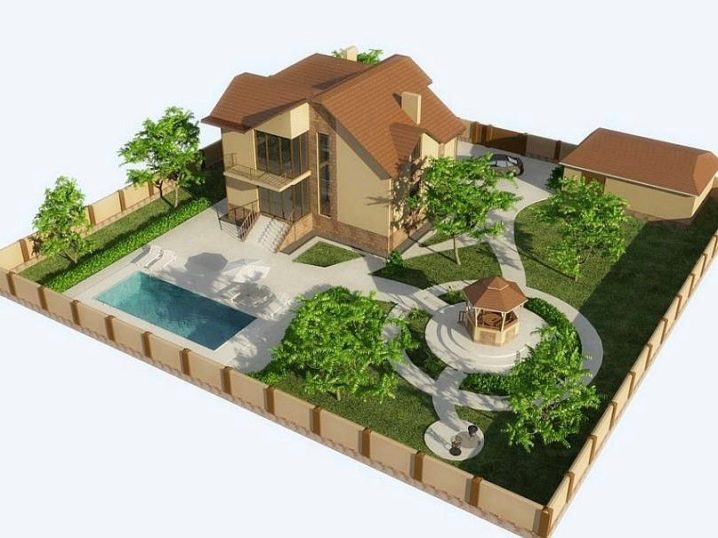
Any area that tapers to one edge (such as a triangle) should be more carefully planned.Usually, in a narrow place, either outbuildings that are suitable in size are located, or an unusual recreation area, a garden.
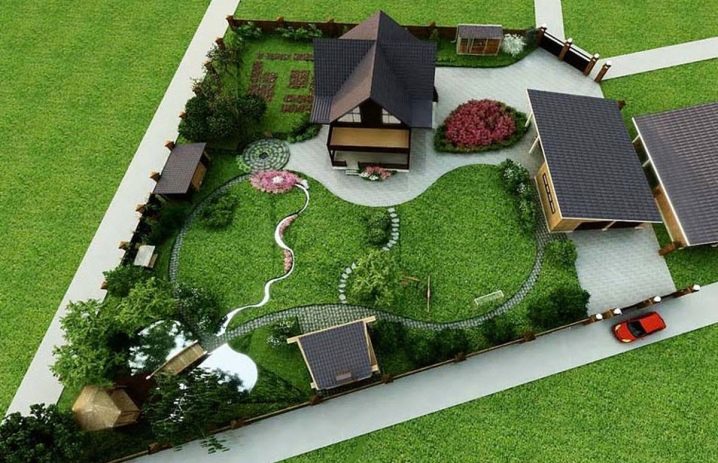
If one of the sides forms a ledge in the shape of the letter "G", then the entire territory is conventionally divided into three parts. Depending on their size, the zones are arranged. As a rule, in the middle part it is a house, and on the sides there is a seating area and a garden.
The arbitrary shape of the cottage allows you to use in design not only straight lines with corners, but also wavy, semicircular and round ones.
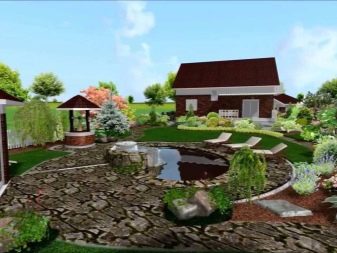
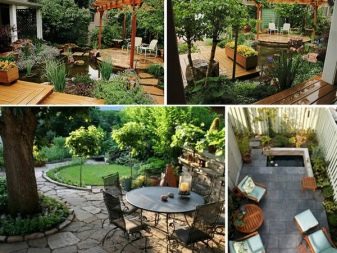
See the next video for more on this.



































































The comment was sent successfully.